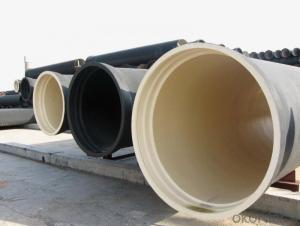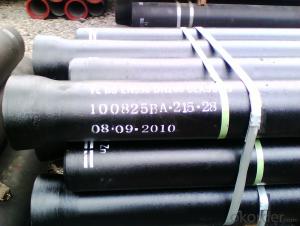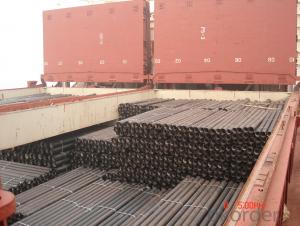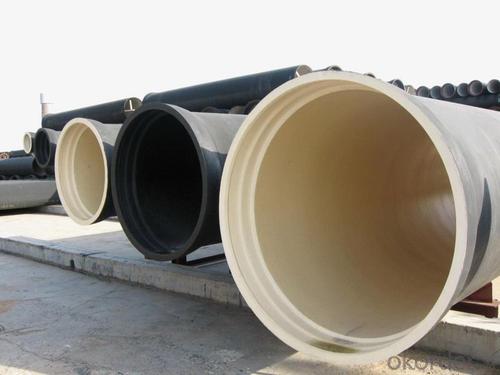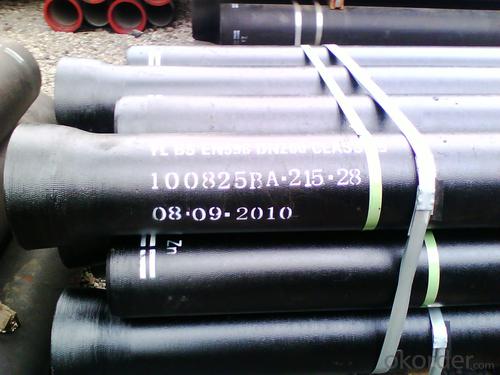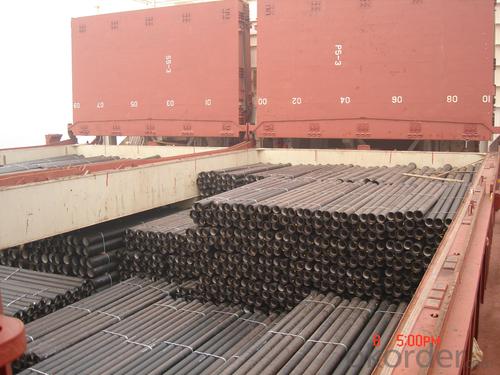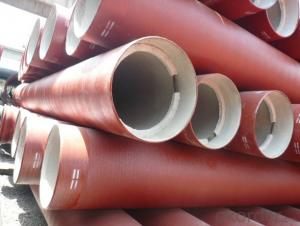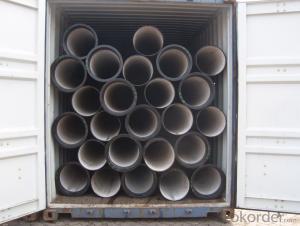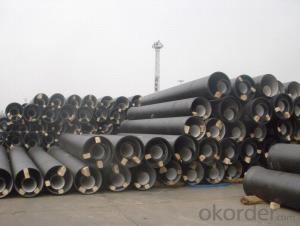Ductile Iron Pipe ISO2531:1998 C30 DN450
- Loading Port:
- China main port
- Payment Terms:
- TT or LC
- Min Order Qty:
- 1000 m.t.
- Supply Capability:
- 50000 m.t./month
OKorder Service Pledge
OKorder Financial Service
You Might Also Like
1.Ductile Iron Pipe Description :
DI pipe fittings are manufactured according to ISO 2531 or BS EN545 or BS4772 FOR POTABLE WATER ,internal is cement lining or wet epoxy coating;External is zinc plus bitumen or wet epoxy coating. We also manufacture ductile iron fittings with fusion bonded epoxy both inside and outside. All the producets are sutible to water pipes fields.
We have passed ISO9001,ISO14001,OHSMS18001 certificate.
2.Main Features of the Ductile Iron Pipe:
•High yield strength
•High tensile Strength
•High corrosion resistance
•Pressure Resistence
•Anti-corrosion
•Installation is convenient
•Satisfy the highest hygienic standards
3.Ductile Iron Pipe Images:
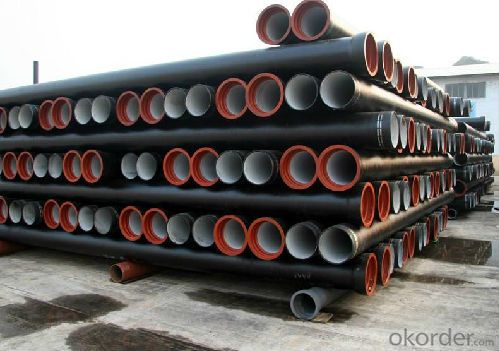
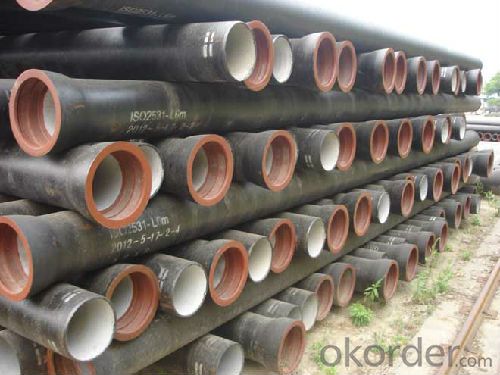
4.Ductile Iron Pipe Specification:
Model Number: DN80-1600
Length: 6M/5.7M/NEGOTIATED
Standard: ISO2531 / EN545
Application: Potable/Sewage Water
Diameter: DN80-1600
Shape: Round
Hardness: 230
Pipe Wall Thickness: standerd
Pull Strength: 420
Yield (≥ MPa): 300
Material: Ductile Iron
water ductile iron pipe: SO2531 / EN545 DI pipe
5.FAQ:
We have organized several common questions for our clients,may help you sincerely:
1.Q: Why would you choose ductile iron pipe rather than other pipe materials?
A:The reasons are obvious for that not only ductile iron pipe possesses the inherent strength and flexibility of ductile
iron, combined with proven corrosion protection systems, but also the cost savings can be achieved from design to
installation and commissioning.
2.Q:Why can you guarantee the inner of pipes can’t be corroded?
A: High alumina cement mortar lining and sulphate-resistant cement mortar lining. These two special linings are applicable
to inner anti-corrosion for sewage pipes, improving resistance to erosion of the sewage components.
- Q: What is the internal lining used in ductile iron pipes?
- The internal lining used in ductile iron pipes is typically a cement mortar lining.
- Q: What is the expected thermal expansion coefficient of ductile iron pipes?
- The expected thermal expansion coefficient of ductile iron pipes typically ranges from 10.8 to 12.2 x 10^-6 per degree Celsius.
- Q: How does ductile iron pipe handle temperature changes?
- Ductile iron pipe is renowned for its effective handling of temperature changes. The exceptional properties of ductile iron give it a high resistance to thermal expansion and contraction, enabling it to endure extreme temperature variations without significant distortions or failures. When subjected to temperature changes, ductile iron pipes can expand or contract within specific limits due to their inherent ductility. This flexibility assists in accommodating thermal stresses and preventing pipe cracking or breakage. The material's remarkable tensile strength and elasticity also contribute to its capacity to manage temperature changes without substantial structural harm. Furthermore, ductile iron pipes possess a low coefficient of thermal expansion, meaning they expand and contract at a relatively gradual rate compared to other materials. This characteristic minimizes the potential for stress on pipe joints and reduces the risk of leaks or failures. In addition to its exceptional thermal stability, ductile iron pipe is equipped with a protective lining that further enhances its resistance to temperature changes. Linings such as cement mortar or polyethylene create a barrier between the pipe and the transported fluid, preventing any adverse effects caused by thermal variations on the pipe's inner surface. Overall, ductile iron pipe proves to be a dependable choice for applications where temperature changes are frequent. Its ability to withstand thermal stresses, low coefficient of thermal expansion, and protective linings make it a durable and efficient solution for various infrastructural needs, including water distribution, wastewater management, and industrial applications.
- Q: How much water seepage is allowed in the water pressure test for water hose DN300?
- The main control parameters of ductile iron pipes are nominal diameter, working pressure, connection mode, etc.. Light, high, thin wall, pressure resistance, shock resistance, corrosion resistance, earthquake resistance and other properties. The flexible interface is used for the pipeline interface, and there is a certain elongation and deflection angle. He has the advantages of raw iron pipes and steel pipes, avoiding the defects of iron and steel.
- Q: How do ductile iron pipes handle ground movement near rivers and lakes?
- Ductile iron pipes are well-suited to handle ground movement near rivers and lakes due to their unique properties and construction. These pipes are made from a type of cast iron that is known for its high strength and flexibility, making them highly resistant to ground movement and other external forces. One of the key features of ductile iron pipes is their ability to withstand bending and stretching without breaking. This flexibility allows the pipes to adapt to ground movements, whether they are caused by natural factors like soil settling, erosion, or even seismic activity. The pipes can absorb and distribute the stress caused by ground movement, reducing the risk of cracks or fractures. Additionally, ductile iron pipes have a high impact resistance, which means they can withstand external forces such as pressure from shifting soil or heavy equipment. This makes them less susceptible to damage during ground movements near rivers and lakes where erosion or flooding can occur. Furthermore, ductile iron pipes have a smooth internal surface, which reduces friction and resistance to flow. This ensures efficient water transportation even in areas with ground movement, preventing any potential blockages or disruptions to the water supply system. To enhance their resistance to ground movement, ductile iron pipes are often installed using flexible joints, such as restrained joints or push-on joints, depending on the specific project requirements. These joints allow the pipes to move slightly without causing damage to the overall system, providing additional protection against ground movement near rivers and lakes. In summary, ductile iron pipes are highly capable of handling ground movement near rivers and lakes due to their strength, flexibility, impact resistance, and smooth internal surface. These qualities make them a reliable choice for water transportation systems in areas prone to ground movement, ensuring a durable and efficient infrastructure for the supply of water.
- Q: What is the expected pressure rating for ductile iron pipes?
- The expected pressure rating for ductile iron pipes typically ranges from 150 to 350 psi.
- Q: Can ductile iron pipe be used for oil and gas transmission pipelines?
- Yes, ductile iron pipe can be used for oil and gas transmission pipelines. It offers excellent strength, durability, and corrosion resistance, making it suitable for the transportation of various fluids, including oil and gas. However, other factors such as specific project requirements, operating conditions, and regulatory standards should also be considered before making a final decision.
- Q: Can ductile iron pipes be used for irrigation of golf courses?
- Yes, ductile iron pipes can be used for irrigation of golf courses.
- Q: Can ductile iron pipes be used for water treatment facilities?
- Yes, ductile iron pipes can be used for water treatment facilities. Ductile iron pipes are known for their strength, durability, and corrosion resistance, making them suitable for transporting water in various treatment processes such as filtration, disinfection, and distribution. Their ability to withstand high pressures and external loads makes them a reliable choice for water treatment facilities.
- Q: How can the ductile iron pipe be welded?
- If the hole on the ductile iron pipe, you can use special hoop lined flexible rubber ring, rubber ring and pipe wall coating with rubber ring, glue to be fixed.
Send your message to us
Ductile Iron Pipe ISO2531:1998 C30 DN450
- Loading Port:
- China main port
- Payment Terms:
- TT or LC
- Min Order Qty:
- 1000 m.t.
- Supply Capability:
- 50000 m.t./month
OKorder Service Pledge
OKorder Financial Service
Similar products
Hot products
Hot Searches
Related keywords
